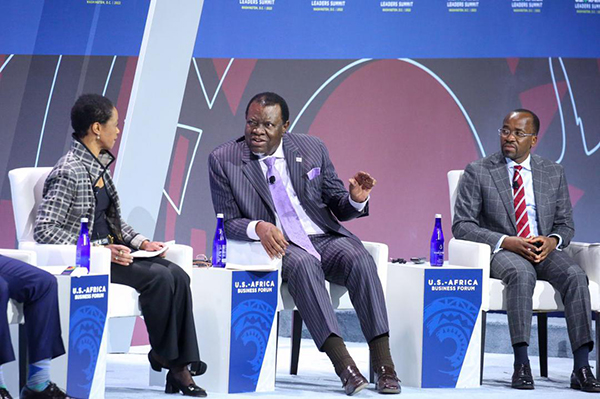Kuzeeko Tjitemisa
WASHINGTON, D.C – President Hage Geingob on Wednesday vowed to champion reforms that will improve the quality of life for all Namibians and Africans in general.
Geingob made this pledge when he participated in a panel discussion on ‘Advancing Digital Connectivity: Partnership to Enable Inclusive Growth Through Technology’.
The discussion was part of the three-day US-Africa Leaders’ Summit that started here on Tuesday and ended yesterday.
The session, among others, discussed opportunities and challenges for the US and Africa to better collaborate to strengthen Africa’s dynamic digital economy, expand internet infrastructure, as well as advance inclusive, secure and sustainable connectivity.
The panellists included Togolese president Faure Gnassingbé.
Geingob said cooperation and development in digital connectivity will be essential to realising the four priority areas highlighted in the US-Africa strategy, which are openness, promoting democracy, recovery from the Covid-19 pandemic and a clean energy transition.
“As the world becomes increasingly integrated and more services become available online in today’s era of the fourth industrial revolution, African nations cannot afford to be left behind,” Geingob said.
He further said digital connectivity, particularly for developing nations, such as Namibia, is among the most critical aspects of digital inclusion, bridging the digital divide for African nations and driving digital markets towards equitable and inclusive development.
“I endeavour, for the remainder of my term as president, to champion reforms, together with the whole of government, towards improved quality of life for all Namibians and Africans in general,” Geingob said.
Geingob said the African Union’s Digital Transformation Strategy 2020-2030 aspires to universal digital access and a single pan-African digital market by 2030.
Also, he said the AU Agenda 2063: The Africa We Want, spells out explicitly how to achieve that single digital market of over 400 million Africans through robust e-commerce infrastructure for formal and informal markets, conducive policies, skills, affordable and reliable ICT services, and venture capital for tech start-ups and innovators.
He added that digital connectivity also proved to be an essential prerequisite for developing nations when the Covid-19 pandemic forced the entire world to adapt and rely on digital connectivity for all services.
“The pandemic exposed the digital divide and necessitated African governments to take a more targeted response to leverage and intensify public investments in soft and hard infrastructure to enable digital services, especially in the education sector,” Geingob said.
“Now, more than ever, Africa is acutely aware of the need to harness digital solutions to increase productivity, drive development and ensure the overall welfare of its citizens,” he added.
Geingob says these solutions must provide the necessary tools and platforms to empower the next generation and must be inclusive of all genders, ages, racial groups and geographies, as well as urban and rural communities.
In pursuit of harnessing the potential presented by digital technologies, Geingob said he appointed a Task Force on the Fourth Industrial Revolution in July 2021.
“Their mandate was to conduct the country’s first 4IR readiness assessment and inform policy and legislative reforms.”
Geingob said his government agencies have commenced implementation of the recommendations by the task force as far as feasible, and the National Digital Strategy is currently under development.
Indeed, he said, Namibia is positioning itself as a green hydrogen hub, and digital connectivity is very much a crucial enabler of this new green hydrogen economy.
This, he said, also speaks to the fourth pillar of the clean energy transition in the U.S-Africa Strategy.



